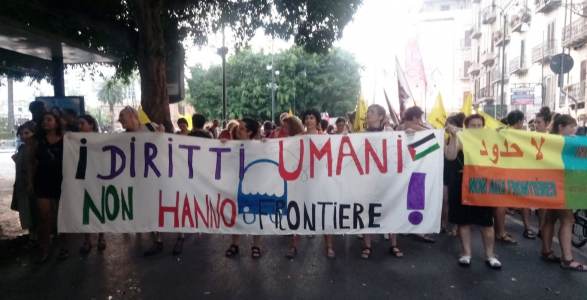The Agrigento mafia’s hand on migrants
ilgiornale.it – Agrigento may be the province which more than any other is experiencing the phenomenon connected to immigration: ghost landings happening also outside the summer season, police forces under pressure especially when the flux of migrants towards the shores of this area increases, villages where the presence of important first reception facilities cause certain social tensions, as in the case of Siculiana.
But there is also another, much more disturbing aspect, unfortunately not a new one neither in Sicily nor in the rest of Italy, which is connected to the business that is made at the expense of the migrants on one side, and at the safety of citizens on the other. Cosa Nostra, like the entire mafia, only gets involved where there are important economic interests at stake. The police operation ‘Montagna’ on the last January 22nd where 56 people were arrested and which represents one of the most important operations against the Agrigento mafia, has revealed, amongst others, the interests of organised crime in the immigration business.
The pieces of the puzzle regarding the intersection between mafia and the migration phenomenon in the Agrigento province have been partly put together in the last hours. In fact, on late Wednesday evening, local media have started to circulate one of the most important news in the area of justice regarding the city in the last years: the repentance of Giuseppe Quaranta, one of the people arrested during the operation ‘Montagna’ and, more importantly, ex mafia boss of Favara, one of the most important communities of the Agrigento hinterland.
He was an integral part of Cosa Nostra starting from 2010 and until 2014 he handled the affairs of the mafia family of his village before being “laid down”, a term which in the criminal environment indicates someone who has been somehow removed from their role: “I had enough – one reads in the decree of the questioning held on the last 29th of January – So I did not let myself be found by anyone, until the moment they told me not to walk in the name of Francesco Fragapane anymore (one of the most important bosses of Agrigento, ed.)”. In his declarations, the newly repentant appears to be a river in full stream: he reveals the names of the current Cosa Nostra bosses in Agrigento, explains how the criminal association is organised, which families are involved and of how many villages each area is composed of. But, above all, he touches the important aspect connected to the migration phenomenon.
As answer to the question about extortion activities he knows about or carried out himself, Quaranta referred to two episodes, one of them regarding the reception facilities for migrants: ‘With Giambrone and Morgante (two important bosses of the Agrigento hinterland) we extorted Non-European citizens – he affirms in his interrogation – Every time Giambrone saw a ’n*****’, he told me there were 45 euro walking”.
In other words, between direct extortions and favours asked to the cooperatives managing the reception of migrants, Agrigento’s Cosa Nostra was aiming to earn an average of almost 50 euro per refugee. Especially the reception system is a business the mafia has an interest in, as has been wholly revealed in Agrigento thanks to the above mentioned operation ‘Montagna’. Sifting through the decrees that emerged after this police operation, for the first time names of cooperatives and societies, which manage the reception centres have appeared in the papers: In particular, there has been proof of an attempt of extortion in the facilities of Favara. But from the investigation emerges also another episode in which, on the contrary, it was the person responsible for a reception centre who looked for mafia exponents in order to start an activity.
That the mafia makes money out of the exploitation of the business with the reception system does not only become clear by the protection money or by the extortions, but also by the identification of facilities that could be rendered suitable to use, and by the possibility to insert their own names amongst the facilities’ employees. This last element may be the most important one: in a province like Agrigento, where lack of work makes it difficult even for Cosa Nostra to be the broker for jobs and employments, having access to the management of the activities of the increasing number of reception centres appears at times vital even for the criminal clan.
The operation ‘Montagna’ further displays that bosses acquired prestige due to their possibility of quickly gaining the oversight of all bureaucratic procedures relative to the opening of new reception centres. In the episode mentioned above, regarding the person responsible for the cooperative who turned to the mafia to look for adequate facilities, it further emerged that this person also requested their assistance in receiving all necessary authorisation by the municipality.
Exchange of favours, extortions, protection money also determined on the basis of the numbers of migrants hosted in the facilities – the emerging picture shows how Agrigento’s Cosa Nostra is more and more a key player in the only flourishing market within the shattered economy of this part of Sicily. The bosses have understood by now that the only sector which, at least for the moment, is not in crisis in those areas is the sector of reception: in the whole Agrigento province the number of reception centres have increased mainly since 2013 onwards, and almost all municipalities host facilities of this kind by now. Cosa Nostra does not seem willing to lose the opportunity of what appears now to be the new, only rewarding branch that could be a useful mean to hold sway over the local economy.
Mauro Indelicato
Translation: Greta Pallaver

